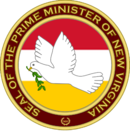Prime Minister of New Virginia
| Prime Minister of the Commonwealth of New Virginia
| |
|---|---|
 Seal of the Prime Minister | |
| Style | The Right Honourable (formal) Prime Minister (informal) |
| Status | Head of government |
| Member of | Cabinet House of Burgesses National Security Council |
| Residence | None official |
| Nominator | House of Burgesses |
| Appointer | President |
| Term length | While commanding the confidence of the majority of the House of Burgesses. No term limits are imposed on the office, and no confidence motion may occur for four months following a general election. |
| Inaugural holder | Dame Elizabeth Lewis |
| Formation | 1 August 2020 |
| Succession | Deputy Prime Minister (becomes acting Prime Minister) |
| Deputy | Deputy Prime Minister |
The Prime Minister of the Commonwealth of New Virginia, also known simply as the Prime Minister of New Virginia, is the head of government of the Commonwealth of New Virginia. The Prime Minister presides over the Cabinet of New Virginia, directs the activities of the Government, and by precedent represents the Government in the House of Burgesses as the Leader of the House. The Prime Minister is appointed by the President on the advice of the House of Burgesses, and is typically the leader of the largest party or coalition within the House.
Following the secession of the Commonwealth from the Empire of Austenasia, the duties of head of government (and head of state) were fulfilled by the Chairman of the Provisional Council. Following the enactment of the Constitution of New Virginia on 1 August 2020, Dame Elizabeth Lewis DNVI of the Free Democrats was appointed acting Prime Minister until a general election was held. She led her party to victory in the first general election and was confirmed as the Commonwealth's first Prime Minister on 28 August.
The fourth and incumbent Prime Minister is Sir Simon White KCSM, the leader of the Free Democrats.
Powers and duties
Under the parliamentary system of government present in New Virginia, the Prime Minister is the undisputed political leader of the nation while the President exercises mostly ceremonial authority. The Prime Minister is granted vast executive authority under the Constitution and advises the President on the discharge of most of their duties.
The Prime Minister is constitutionally designated as the head of the Government and the chief executive of the state. The Government, which itself is vested with the supreme executive authority of the Commonwealth, is mostly appointed by the President on the binding advice of the Prime Minister (with the exception of agency directors within the ministries, who are appointed by the relevant ministers with the Prime Minister's advice). The Prime Minister presides over sessions of the Cabinet - a body consisting of the Prime Minister, their deputy, and all government ministers - and directs the work of its members. The Prime Minister speaks on behalf of the Government as a whole and represents the interests of the Government in the House of Burgesses. The Prime Minister may, at any time and for any reason, request the resignation of the Deputy Prime Minister or any government minister - if a minister fails to comply with the request, the Prime Minister may advise the President to forcibly terminate the appointment.
The Prime Minister and the Government as a whole are responsible to the House of Burgesses. The Prime Minister is constitutionally required to regularly report to the House on the activities of the Government, and a special period of time for questions to the Prime Minister from burgesses is set aside at least once a month. The Prime Minister is granted the right to cast a deciding vote in the event of a tie of the House, regardless of whether they have already voted or not. The Prime Minister is additionally a member of the National Security Council.
Appointment
The Prime Minister is appointed by the President of the Commonwealth through a proclamation on the advice of the House of Burgesses. Under the Constitution of New Virginia and the standing orders of the House of Burgesses, a potential Prime Minister must have the support of an absolute majority of all burgesses; for example, in a House of ten members, a majority of six votes for a candidate must be achieved for that person to become the House's nominee. Voting takes place in rounds until a nominee is yielded; however, in the event of no clear nominee, the Speaker may advise the President to dissolve the House if the minimum period of four months since the last general election has passed.
Following the selection of a nominee, the Speaker of the House of Burgesses formally communicates the House's advice to the President. Under the Constitution, the President is bound to appoint the person whom the House has voted for by proclamation. By precedent, the President appoints the Prime Minister in a brief public ceremony where they read the proclamation of appointment aloud and then sign the proclamation in the presence of those attending. The newly appointed Prime Minister is then welcomed by the President to make remarks regarding their appointment and their plans for the term ahead. Following the ceremony, the President and Prime Minister meet to discuss the appointment of the Government. Unlike the President, there is no official oath of office for the Prime Minister; however, every Prime Minister to date has included promises to govern fairly and in accordance with the law in their first address.
Removal
The Prime Minister holds their office while maintaining the confidence of a majority of the House of Burgesses; therefore, numerous potential situations may arise whereby the Prime Minister may lose their office. In the event of the governing party losing their majority in the House following a general election, the leader of the new majority party will typically be nominated as the new Prime Minister; however, the incumbent will remain in office until a new Prime Minister is appointed. The House of Burgesses may also force the resignation of the Prime Minister through a motion of no confidence no sooner than four months following a general election. A Prime Minister may also resign by their own free will. If the resigning Prime Minister has a Deputy Prime Minister, the President will accept their resignation and the Deputy will serve as acting Prime Minister until a new Prime Minister may be nominated. While it has yet to happen, in the event of a Prime Minister without a deputy resigning, it is likely that the President would not accept the resignation until a new Prime Minister is nominated for appointment.
Acting Prime Minister
In the event of the resignation or temporary incapacity of the Prime Minister, the Deputy Prime Minister may be granted the Prime Minister's powers and responsibilities as acting Prime Minister. The office of acting Prime Minister has come around as a result of convention rather than constitutionality, based on precedent set under the premiership of Dame Elizabeth Lewis. At present, the office of acting Prime Minister has been occupied three times:
- Dame Elizabeth Lewis, from 1 August 2020 to 28 August 2020. Only acting Prime Minister to hold the office by constitutionality; through the transitional period following the enactment of the Constitution and the first general election, the President was empowered to appoint an acting Prime Minister with the consent of the Provisional Council to preside over the Council and direct the provisional government. Was confirmed as the first Prime Minister following the 2020 general election.
- Dame Sophia Albina, from 5 December 2020 to 22 December 2020. Originally designated as acting Prime Minister on a temporary basis by Prime Minister Lewis; however, following Lewis's resignation on 18 December 2020, Albina held the office without an incumbent Prime Minister until her confirmation as Lewis's successor on 22 December.
- Dame Elizabeth Lewis, from 15 February 2021 to 17 February 2021. Appointed directly by President Dame Vera Hewitt DNVI following the unexpected resignation of Dame Sophia Albina, who had no Deputy Prime Minister. Confirmed by the House the following day and appointed by the President the day after that.
- Sir James Frisch, from 3 March 2021 to 3 April 2021. In his position as Deputy Prime Minister, Sir James assumed the role until the confirmation of Sir Simon White as the 4th Prime Minister by the House on 3 April.
List of Prime Ministers
| # | Portrait | Name Honorifics and Constituency |
Term of office — General election(s) |
Other offices held | Party | Deputy PM | President | |
|---|---|---|---|---|---|---|---|---|
| 1 | 
|
The Right Honourable Dame Elizabeth Lewis DNVI BP Burgess for Shoreline |
28 August 2020 |
18 December 2020 |
- Leader of the House
- Minister of Defence - Currency Production Commissioner - Ambassador-at-large to the Empires |
Free Democrats | (1) Bradley van Dullahan (2) Sophia Albina |
Dame Vera Hewitt 2020–present |
| 2020 | ||||||||
| A Founder of the Commonwealth. Served in an acting capacity from 1 August 2020 to 28 August 2020 under the transitional period between the provisional and constitutional governments, confirmed following 2020 general election. Led a coalition government between the Free Democrats and the National Party until 15 October 2020, when Deputy Prime Minister Bradley van Dullahan and all National Party members resigned from the government in the interest of developing the partisan system. Led a majority FDP government following the resignation of the Nationals. Led the government through the ratification of the Augusta Accord and oversaw the Commonwealth's entry into the Borean Community. Laid foundations for a national economy. Established the National Bank and the Currency Production Commission. Established the Ministry of Justice. Resigned for personal and family reasons. | ||||||||
| 2 | 
|
The Right Honourable Dame Sophia Albina DCSM BP Burgess for New Franklin-at-large |
22 December 2020 |
15 February 2021 |
- Leader of the House
|
Free Democrats | (1)Thomas Bainbridge | |
| 2021 | ||||||||
| Previously served as Deputy Prime Minister and President of the National Bank under the premiership of Dame Elizabeth Lewis. Served as acting Prime Minister from 5 December 2020 under Dame Elizabeth and from 18 December 2020 alone. Confirmed as Prime Minister on 22 December on the second ballot following an inconclusive first round. Initially presided over a coalition government between the Free Democrats and the Commonwealth Whig Party, with Whig leader Thomas Bainbridge as her Deputy Prime Minister; however, following Bainbridge's resignation in the wake of the Bainbridge scandal, led an FDP minority government which dissolved the House soon after. Led the Free Democrats to victory in the 2021 general election, securing an absolute majority. Resigned eight days after the general election due to personal issues. | ||||||||
| 3 | 
|
Lieutenant Colonel The Right Honourable Dame Elizabeth Lewis DGCSM DNVI BP Burgess for Shoreline |
17 February 2021 |
3 March 2021 |
- Leader of the House
- Minister of Defence - Commandant of the Defence Force - Ambassador to the Borean Community - Governor of Nubes Peaks |
Free Democrats | (1)James Frisch | |
| None | ||||||||
| Served as acting Prime Minister from 15 February to 17 February. Confirmed in an historically bipartisan confidence vote. Governed over a hung parliament, with both the Government (including the Speaker, who caucuses with the FDP) and the Opposition having six seats. Upon her resignation, Deputy Prime Minister James Frisch served as Acting Prime Minister until the succession of Sir Simon White to the position. | ||||||||
| 4 | The Right Honourable Sir Simon White KCSM BP New-Franklin-at-Large |
3 April 2021 |
Incumbent | Free Democrats | (1)James Frisch | |||
| None | ||||||||
| Originally appointed as Chancellor by the Provisional Council, Sir Simon White served many roles within the New Virginian government, including in the Senate until he resigned and was elected to the House of Burgesses in the 2021 New Virginian general election as a Free Democrat. Upon the resignation of Dame Elizabeth Lewis, White was nominated by the former Prime Minister for the position. In opposition, the National Party nominated Sir Bradley van Dullahan. After it became apparent that attendance issues would make it impossible for the National Party to appoint van Dullahan to the position, the House unanimously made Simon White the 4th Prime Minister of New Virginia. | ||||||||
